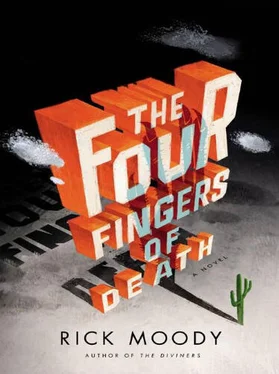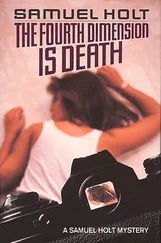“Are you all right?” I said. “For godsakes, Jim, say something .”
I had become afraid. I had been in some bad spots on the Mars mission. Maybe there had been a lot of times, such as when my fingers were hacked off by Brandon Lepper, when I’d been temporarily worried. But the professionals back on Earth had trained me well. True, I was never certain I would live out my term on the Mars mission, but even that didn’t frighten me. I was never affrighted on Mars, until now.
He shook off his cloud, as best he could, and he attempted, thickly, to say something. Whatever had happened to him out there had begun to affect his speech centers, his fine motor skills. Whether he knew entirely what he was saying wasn’t clear to me either. There was a dull, plodding quality to his speech.
“I’m not feeling very well, Jed.”
“I can see that. What happened out there?”
“A lot happened. I don’t know if I’m well enough to tell it.”
He slumped onto the floor, barely sitting up, and I came near to him. And I looked into his dead eyes.
“Do you want me to call Arnie?”
“What happened to Abu?” he whispered.
“Steve appears to have gone off to help Brandon, among other things. Apparently, NASA was communicating with him all this time. And Abu is… as you see. A casualty of greater historical forces.”
A long, concerned exhalation, as if all the air left on the planet were expelled from the lungs of Jim Rose.
“What is it?” I said. “Tell me how to help.”
That was the moment in which the halting and uncertain tongue of the now afflicted Jim Rose rambled back through his adventures, much of it concerning the absolutely statistically improbable encounter with the explorer called the Saratoga . He kept coming back to the explorer. It was a thought that he couldn’t relinquish. He wanted to know if NASA could possibly have got in touch with the Saratoga , in order to send it against us, in order to scuttle our colonial ambitions. Except that, as he said, there was nothing misleading about the Saratoga . It had spoken frankly to him. And it had warned him about everything that was going on. Did that seem possible? he wanted to know. I confess that it was hard for me to believe any of this. I assumed that the story was a delusion of his illness, not a genuine happenstance that he was reporting to me from his time away. His impressions tumbled out helter-skelter, and I couldn’t always understand him, but I could hear, in the thickness of his incoherences, a fever to narrate, and so I let him talk for a while. Chief among the contradictions that he could not reconcile, especially in his condition, had to do with the possible military applications of the Mars mission, hinted at by the Saratoga . Were we, he wanted to know, supposed to be harvesting M. thanatobacillus , as he and I had long assumed we were? Or was there some other military application that had to do with the perfectable crystals of silicon dioxide out in the Valles Marineris, as told to Steve Watanabe? Or were these two reasons for the mission somehow linked up, like some chain of supercomputers, such that there was a biotechnical purpose to all of this, which, in cooperating, we were hastening? These questions were hard for him to articulate, as though he could no longer talk about the very issues that he himself had raised on Mars, as though, like the Moses he now resembled, he was destined not to participate in the Martian civilization he had brought about. It was after he had been talking in this way for a while that he admitted to having found abundant sources of water.
“You what?”
“It’s almost everywhere.”
“And do you have some with you?”
He rummaged through his pack, which lay beside him, forcing some zippers abraded with Martian grit, and produced a couple of bottles of it. There were also drums of the stuff in the hold of the ultralight.
“It… vaporizes outside. But I think if we keep it—”
“Inside. Right. Did you—”
“I drank some.”
“You drank some?”
“I drank a lot.”
“Jim, are you out of your mind?”
“Someone had to do it.”
“It might be radioactive, on top of everything else. Are you feeling sick? We should have boiled it first! Or we could have ionized it. It’s no wonder you’re feeling ill. I’m going to call Arnie.”
He just needed to sleep, he said, and maybe something to eat, and yet despite how famished he was, he said, despite how beat up his body must have been, how frostbitten and irradiated and exhausted, he’d never felt more alive. The very cells of him had been lit up by the heavens, by the actual heavens , the almost infinite ocean of stars, not the ground on which we found ourselves. And it was at this moment that he did something so horrible that I don’t even know how to describe it. Upon getting to his feet he paced, shambled, from one side of the cargo hold to the other, and while teasing out some hard-to-follow part of his story, he went over by where Abu lay, and gazing upon our Muslim sculptor, Jim just cupped his hand over Abu’s mouth and nose, pressed hard, and then, turning fully upon the slumbering man, he put a little muscle into it and held the breathing passageways closed. Until Abu, the sculptor, was no more.
It was so studied in its casualness, this dispatch, that I didn’t really take in what he was doing at first. I couldn’t believe what was happening; I didn’t believe I was seeing it, which may have had to do with the opiates, with the amount of them flooding the moral center of my brain. How many times I have thought back on this moment since, and wondered how to interpret what took place onboard the Geronimo . Was the old Jim, the Jim I once desired, still in there somewhere, was it he who recognized immediately that we couldn’t carry Abu like that, given the shortage of resources? This old Jim understood mercy, and he knew that this sort of mercy was not permitted on the home planet. There were no laws governing what we could and couldn’t do on Mars. Pragmatic decisions were required here. They were within our power. But part of me believed it was Jim’s illness, whatever it was, that made the decision. Without feeling. The second of these hypotheses was the darker one, a theory that was hard to ignore under the circumstances, that Jim was no longer Jim.
I said, “Do you want to move in here, into the reactor camp, with me?” Hoping that the thought would never occur to him. “We could go back to the Excelsior and bring some of your stuff over here. Make it a bit more habitable. Like a proper home.”
Did I detect some kind of fiendish laugh? Was the new Jim capable of a fiendish laugh? It was perhaps some variant on the deceitful snorting that I had noticed in the old Captain Jim Rose. His reply was long in coming. And he stood up straighter, while pacing, as if to deliver it like a proper orator of old.
“I’m going to Valles Marineris.”
“You’re going—”
“To find Brandon.”
“And what do you propose to do when you get there?”
No answer.
“Will you, at least, leave some of the water behind so we can test it?”
He nodded, but in heading for the door he offered little more. It was me who kept filling in the empty spots in the Mars mission now, with the pleasantries, the witticisms, the little things that are so easy to say and which, whether you believed in them or not, made the people around you feel a little better. The pleasantry was perhaps one of Earth’s greatest exports. The mild but generous ways that people lied to one another about their hopes and fears. If I had a longing, after the advent of Jim’s illness, his change of character, it was for just one stranger with whom I could venture a few harmless pleasantries.
Читать дальше












